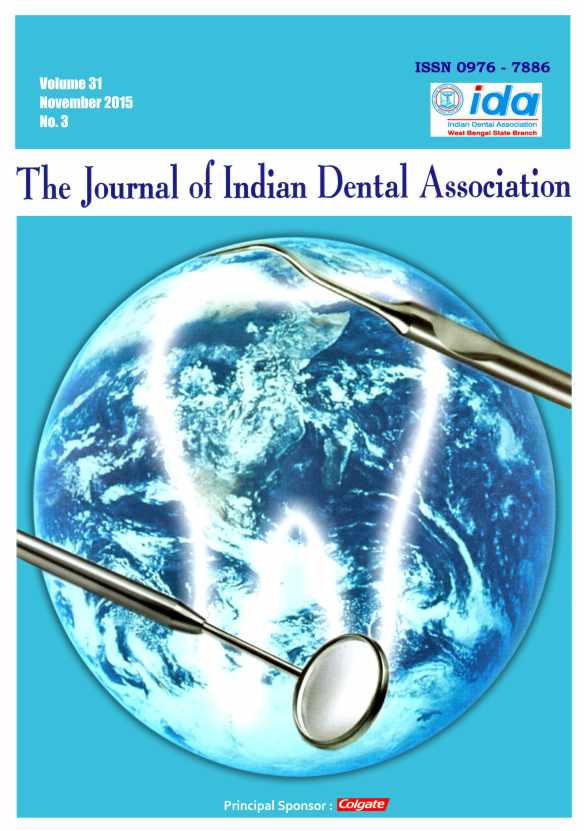Upcoming Events
1. Article Title.
2. Author Details.
3. Abstract.
4. Keywords.
5. Corresponding Author details.
March 2016
Volume : 32
No.: 1

Dr. A Saha,Dr. T. Tanwani,Dr. D. K. Mandal,Dr. A. Dangre,Dr. P. Deshmukh
Abstract: Failure of a fiber post and composite resin core often occurs at the junction between the 2 materials. This failure process requires better characterization. The present study was aimed to evaluate Shear Bond Strength between Fiber Post and Composite Resin Core Materials. 20 post samples (3 ±0.1 mm in length) each of three different glass fiber posts were surface treated and bonded with the composite cores supplied by the respective manufacturers, namely,FRC Postec Plus with Multicore Flow [IvoclarVivadent AG, Liechtenstein (Group A-PPM)], Radix Fiber Post with Core X Flow [Dentsply, Maillefer, Switzerland (Group B-RFC)] and Rely X Fiber Post with FiltekTM Z350 XT [3M ESPE AG, Germany (Group C-RXF)]. Shear bond strength values were measured using a universal testing machine and data were analyzed by one way ANOVA Test and Post Hoc Test. The results were obtained and it was concluded that the shear bond strength between FRC Postec Plus and Multicore Flow was found to be maximum and hence can be used for restoring an endodontically treated tooth that have insufficient coronal tooth structure to retain a core for the final restoration.
Abstract: Periodontitis is a polymicrobial infectious disease with marked inflammatory response, leading to the destruction of the underlying periodontal tissues. Periodontal therapy directed to eradicate these pathogens and attain periodontal health can be accomplished by either non-surgical methods alone or in combination with surgical means. Topical and systemic antibiotics are prescribed in both forms of therapy. The aim of this review article is to provide basic details of a few such systemic anti-microbial agents used in periodontal therapy.
Abstract: The legal implications of present day medical practice need to be understood carefully. The treating doctor/dentist and the patient both have certain legal rights. These have to be respected and understood by both. The doctor - patient relationship has to be appreciated. It is the responsibility of the doctor to educate his patient about the nature of his ailment and the reasons for following a particular treatment protocol. The patient in his capacity must understand his treatment, and must give a written informed consent to the doctor concerned.
Dr. Debaprasad Das,Dr. Anirban Bhattacharyya,Dr. Vishal Singh,Dr. Ashim Maity
Abstract: Mucosal fenestrations are rarely encountered in clinical practice, and as such their management is not reported often. Their treatment might be further complicated due to a communication with the oral environment, making them more susceptible to accumulation of debris, plaque and calculus thereby reducing the probability of mucosal renewal. The aim of the present case report is to highlight one such rare clinical scenario and its apt and effective management.
Dr. Selim Akhtar,Dr. Snehanjan Sarangi,Dr. Mrinmoy Kerketa,Prof.(Dr.) Sanchita Kundu
Abstract: Central Giant Cell Granuloma (CGCG) is a relatively common, localized, osteolytic lesion that almost exclusively occurs in the jaw bones. Females are more frequently affected while the average age of involvement is below 30 years. The lesion predominantly occurs in the mandible, occasionally extending across the midline, whereas involvement of the posterior jaw is decidedly uncommon. Having an uncertain origin, CGCG have been the center of active debate and research regarding its nature and behavior for the last few years. Here in a case of CGCG affecting an 18 years old female involving the posterior mandible is presented. Through this article an attempt will be made to collect and collate the current information pertaining to the nature and biological behavior of CGCG by critically reviewing the available literatures.
Dr. Soumalya Das,Dr. Sujayesh Halder
Abstract: Children and infants are known to naturally put objects in their mouth. However it is rare to see a foreign object in a deciduous tooth. The mention of such an incidence in dental literature is very rare. The following case reports of a foreign body (metal ball) lodged in a deciduous tooth of a 4 year old female patient.
Dr. Nabarun Chakraborty,Dr. Mandira Ghosh,Dr. Tridib Banerjee,Dr. Amit Bera,Dr. Shiny Konar
Abstract: This article presents a case report of a complete denture fabrication in a flabby maxillary ridge and severely resorbed mandibular ridge situation.This situation was treated with a special impression technique of maxillary ridge which will compress the non flabby tissues to obtain optimal support, and, at the same time, will not displace the flabby tissue. For severely resorbed lower ridge neutral zone technique is followed to achieve maximum stability
Dr. Manas Naskar,Dr. Tirthankar Debnath,Dr. Sanghamitra Samanta,Dr. Pradip Giri
Abstract: “Pyogenic Granuloma” or “Granuloma Pyogenicum” is a tumour like growth which is an exaggerated conditioned response to minor trauma or underlying irritating factors. It may be pedunculated or sessile with smooth or ulcerated or warty surface and very often shows tendency for haemorrhage either spontaneously or on slightest provocation. The lesion is found most frequently on the gingiva sometimes called as gingival epulis. This article presents a series of cases of this common lesion and deals with non-surgical management of the same
Dr. Rajarshi Banerji,Dr. Subhransu Basu,Dr. Sandeep Pachisia,Dr. Mayukh Misra
Abstract: The pregnant patient requires special attention for dental and surgical management owing to the inherent risk of harming both the mother and the unborn baby.During pregnancy, dental treatment may be modified but need not to be withheld, provided the risk assessment is made properly for both the patient and the fetus . This article discusses the different physiological and anatomic changes occuring during pregnancy and their proper evaluation and management during dental and oral surgical procedures.
Dr. Asim Maity,Dr. Sk. Rahaman,Dr. Joydeep Hazra
Abstract: The mandibular canine isknown to be a single-rooted tooth with a single root canal.However, two canals with a single root and more rarely two canals with two roots have been reported. This article presents twocase reports ofmandibular canine. The first case report presents two root with two canals and the second case report presents single root with two canals. Clinicians should always consider the presence of anatomical variations in the tooth morphology during endodontic treatment. Despite the low prevalence, variations may occur in the number of roots and root canals of mandibular canine, as demonstrated in this case reports.












